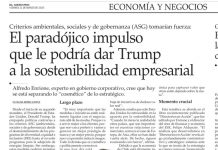Fuente: Directors & Boards
This year’s most popular articles covered everything from corporate purpose to the ethics of AI
The article that got the most engagement on Directors & Boards this year was an interview with an influential corporate governance judge who called on directors to do their part in derailing the rising inequality in society.
Diversity and inclusion were also hot topics on the site, and the ongoing debate over how directors should move forward when it comes to environmental, social and governance issues. And artificial intelligence, particularly how boards navigate the predicted dramatic changes that will result, continues to be of interest to our readers.
Here’s a list of the top 10 stories this year.
Influential corporate law judge Leo Strine discusses the role directors, investors and executives can play in curtailing income inequality and strengthening societal good (By Eve Tahmincioglu)
The continued undervaluing of employees has brought corporate America to a precipice, and in order to keep the economic system from buckling, institutional investors, management and boards need to look in the social-purpose mirror, says the nation’s most influential corporate law judge.
The economic pie has grown considerably, says Delaware Supreme Court Chief Justice Leo Strine, but the rank and file’s share is much less than it was 30 years ago, which affects the community at large. That’s led to more income inequality and less satisfaction, and is the result of actions by large investors and corporate leaders.
“There is going to be a level of inequality where people are just not going to take it. Frankly, they’re not going to trust business elites and for a good reason,” explains Strine, who heads the high court in Delaware, a state where two-thirds of Fortune 500 companies are incorporated and whose corporate laws are often considered the de facto law of the land.
To deal with the issue, he maintains, there are “a variety of sensible things that can be done to invest in our economy to create better jobs.” But he also believes that boards needs to give workers more leverage and more pay, especially in the context of an increasing number of employees becoming shareholders themselves through 401K plans and mutual funds. “If this is supposed to be a shared system, especially if we’re going to make workers be stockholders, then they ought to see the returns in their paycheck.”
The following is a Q&A with Strine, who sat down with Directors & Boards to share his thoughts on what directors can do within the confines of the law to embrace the growing environmental, social and governance movement. He offers his insights for our year-long “The Character of the Corporation” series, which explores the very essence of a company’s approach to generating a profit and how that impacts all stakeholders, employees and communities, and not just shareholders.
2. THE PURPOSE DEBATE Western Union’s First ESG Report
CEO Hikmet Ersek rides the “purpose” train, supported by the board (By Eve Tahmincioglu)
At Western Union, we believe we can be more successful as a company when we operate according to the highest ethical standards, address unmet social needs and promote the well-being of our consumers, their communities and the environment.
Those are the opening words of Western Union’s inaugural environmental, social and governance (ESG) report released this past summer, a report that was spearheaded by the CEO and supported by the board of directors.
Hikmet Ersek, CEO and a director at Western Union explains: “Investors have been asking ‘what is your purpose and how are you implementing that?’ I was thinking about ESG and I went to the board. They were supportive,” of creating the report that details what the company has been doing, and plans to do, globally, he says.
The board, he continues, “sees that ESG is more than a report. It’s about positioning the company on what we’re standing for.” Western Union is a “purpose driven company,” he says, adding that the board really wanted to promote that mission and the report “so we can be used as an example for other companies.”
3. Report: Director Assessments Are Lacking
Here’s how boards can improve their own performance while promoting refreshment (By Rusty O’Kelley and Matteo Tonello)
Director assessments in the United States need an overhaul.
The annual board performance assessment, when conducted, tends to rely on director surveys and other self-evaluation tools. But more importantly, companies continue to forgo, or at least forgo reporting, a systematic process that extends beyond the collective performance of the board or its committees to also evaluate the contribution of individual directors, according to a recent review of disclosure documents filed by companies in the Russell 3000 index.
Only 14.2% of the Russell 3000 companies report having instituted such an annual process at the individual director level, a share that has barely grown since 2016 (13.2%); in the S&P 500, the percentage remains shy of 30%.
That’s a problem, especially in an ever-changing, business-risk environment.
4. The Board’s Role in Cultivating an Inclusive Culture
“Just selecting a strong group of high-ranking executives doesn’t cut it,” say PwC and Ariel Investments chairmen (By Tim Ryan and John W. Rogers)
Mellody Hobson, co-CEO of Ariel Investments and vice-chair of the board at Starbucks and JPMorgan, has consistently talked about greater opportunities for minorities, women and other underrepresented employees at all positions.
“When I’m in boardrooms, I seek to ask questions,” she said in a 2018 TED interview. “And when asking questions, you put people in the position of having to respond, or at least to think. And so even if it’s not work, if you’re not in that hiring position, you might say, ‘Listen, I’ve noticed, wow, we’re attracting the same kind of people over and over again. What can we do to expand the opportunities?’”
When it comes to talent management, the traditional role of boards has been to provide oversight of the c-suite, including CEO succession. But many boards have recently realized that just selecting a strong group of high-ranking executives doesn’t cut it.
The c-suite must be able to execute a successful growth strategy, which requires talented people and strong succession planning at all levels of the company.
With the lowest unemployment rate in the past 50 years and an environment of sweeping technological change that requires new skill sets; attracting, developing and retaining broad, exceptional talent is so critical to corporate success that it has begun to move onto many board agendas.
While diversity and inclusion (D&I) are one element of a talent management strategy, far-sighted boards recognize its growing in importance as a priority. Some of the reasons are obvious: workforce demographics continue to diversify. By 2045, many demographic experts predict the U.S. will be a “majority-minority” nation where non-Hispanic whites of all ages comprise less than 50% of the total population. And by 2020, for the first time, a majority of people under age 18 will be people of color.
5. Oracle of Omaha Slams Independent Directors for Kowtowing to CEOs
Buffett’s attack is the latest high-profile attack on independent boards (By Eve Tahmincioglu)
Warren Buffett, the chairman and CEO of Berkshire Hathaway Inc. who’s known as the Oracle of Omaha, slammed independent directors for being too focused on their paychecks, and not on keeping the CEO in check.
“You don’t get invited to be on boards if you belch too often at the dinner table,” Buffett said at the company’s annual meeting in Omaha, Neb.
“I’ve been on 20 public company boards; I’ve seen a lot of corporate boards operate. The independent directors, in many cases, are the least independent,” he explained. If directors get about $250,000 a year, and that’s an important part of their income, he added, “they’re not going to upset the apple cart.”
The incentive for those directors, he continued, is to go along with the CEO. That way, if the CEO of another company calls about that director, he or she will be described as having never raised any problems. “How independent is that?”
6. Making Sense of SEC’s Proposed Human Capital Disclosures
When it comes to the environmental, social and governance movement, Securities & Exchange Commission Chairman Jay Clayton acknowledges the growing drumbeat for ESG reporting standards. But he cautioned against lumping all things ESG together because it could muddy the disclosure waters for investors.
On the human-capital side of ESG, however, his agency has been evaluating whether a revamp is needed. “Our current disclosure requirements date back to a time when companies relied significantly on plant, property and equipment to drive value,” Clayton told Directors & Boards in a recent in-depth interview.
To that end, last week the agency released proposed new rules to update risk disclosures.
Some highlights from the proposal include:
- clarify and expand its principles-based approach, by including disclosure topics drawn from a subset of the topics currently contained in Item 101(c);
- include, as a disclosure topic, human capital resources, including any human capital measures or objectives that management focuses on in managing the business, to the extent such disclosures would be material to an understanding of the registrant’s business, such as, depending on the nature of the registrant’s business and workforce, measures or objectives that address the attraction, development, and retention of personnel; and
- refocus the regulatory compliance requirement by including material government regulations, not just environmental provisions, as a topic.
7. Best Buy to Get Woman CEO; Majority Female Board
The retailer’s gender diversity phenomenon is about finding the best candidates, not tokenism (By Eve Tahmincioglu)
For the first time in its 53-year history, Best Buy will have a woman in the corner office.
This week, Best Buy announced Corie Barry, the electronics retailer’s chief financial and strategic transformation officer, will become CEO in June, replacing Hubert Joly who is also chairman.
Barry will also get a seat in the Best Buy boardroom while Joly transitions to the newly created role of executive chairman; bringing the total members of the board to 13, including seven women.
Best Buy joins General Motors in recent news about a corporate board tipping to mostly women. According to Automotive News: “Women will become the majority on the board of General Motors this year after two male directors retire. It’s a first for an automaker and places GM among a handful of companies with roughly the same number of men and women at the highest level.”
Diversity and inclusion is becoming a focus for some top corporate leaders, including Best Buy, but the priority of the board has always been on finding the best candidates for the c-suite and boardroom.
8. Compensation Committees & ESG
Human capital management and oversight should be a bigger part of the agenda (By Don Delves and Ryan Resch)
Environmental, social and governance (ESG) issues are increasingly important to boards and their compensation committees, especially human capital management, as a critical part of the “S” in ESG.
Comp committees realize it directly relates to their mission, long-term strategy and success, and they’re being more proactive.
Here are three recent examples. We chose to not identify two of the companies.
- At Royal Dutch Shell plc., the company committed to use ESG as an executive compensation performance measure in an effort to reduce its net carbon footprint 20% by 2035 and 50% by 2050. Executives’ pay will be linked, in part, to this target, through an energy transition measure within their 2019 long-term incentive award.
- Board members of a power generation company asked for more insights after a social responsibility report found a gender pay gap existed based on the ratio of average female to male pay. The analysis examined demographics by level; pay gaps by level and job family; and promotion and pay increase trends by gender. Findings reinforced that the company was paying men and women in jobs of equal value at similar levels. However, the check also uncovered that more men worked at higher levels of the organization, and an inclusion and diversity strategy was needed to encourage a better gender balance at all levels of the organization.
- An integrated oil and gas company wanted better insights on key human capital metrics in support of the organization’s people strategy so management proposed a series of measures in a dashboard that could be updated quarterly for review at each committee meeting (e.g., demographics, promotion/turnover rates, talent pipeline, wellness, safety, and productivity/returns). The dashboard for the compensation committee provides greater context for each performance measure (i.e., historical trends and/or relative benchmarking against other organizations) and includes a mixture of leading and lagging indicators.
The growing role of the compensation committee in human capital management and measurement is driven by several fundamental, transformational forces including engaged institutional and activist investors, new regulation and more diverse boards.
9. The Character of the Corporation: The Story of “S”
What does “social” in ESG encompass? (By April Hall)
Defining the “S” in ESG (environmental, social and governance) issues and responsibilities in corporate America seems to be a moving target.
Even the U.S. Securities and Exchange Commission has no definition for “social” responsibilities, according to a spokesman with the agency.
Directors face a conundrum. There are no legal criteria to measure if a company is doing ESG right, but there is growing pressure to report on it.
Many agree that “environmental” and “governance” seem easier to define. But the “social,” defined by Merriam-Webster as “relating to human society,” is a challenge given its “ambiguity,” says Georg Kell, the founding director of the United Nations Global Compact, the world’s largest voluntary corporate sustainability initiative working with thousands of corporations in 160 countries.
10. The Board’s Role in Setting Up AI’s Ethical ‘Guardrails’
Boardroom discussions on artificial intelligence and machine learning’s impact on humanity need to be fast-tracked (By Eve Tahmincioglu)
Whenever there are discussions in the boardroom about artificial intelligence (AI) and how the technology may fit in the company’s strategy, Linda Goodspeed likes to bring up two questions: “What decisions are we going to allow machines to make, and how are we going to audit those decisions?”
While Goodspeed, a former CIO who sits on the boards of AEP, AutoZone and Darling Ingredients, says AI and machine learning (ML) implementation is still in the early stages for the companies she serves on, “thoughtful discussions” about how to carefully adopt the technology are critical.
For many companies and their boards, it’s early days for AI adoption and in particular, ML, but the recent rush to implement the latest and greatest so you’re not left behind is causing some to worry about whether corporate leaders are taking enough time to consider the potential impacts on employees, communities and society at large.












